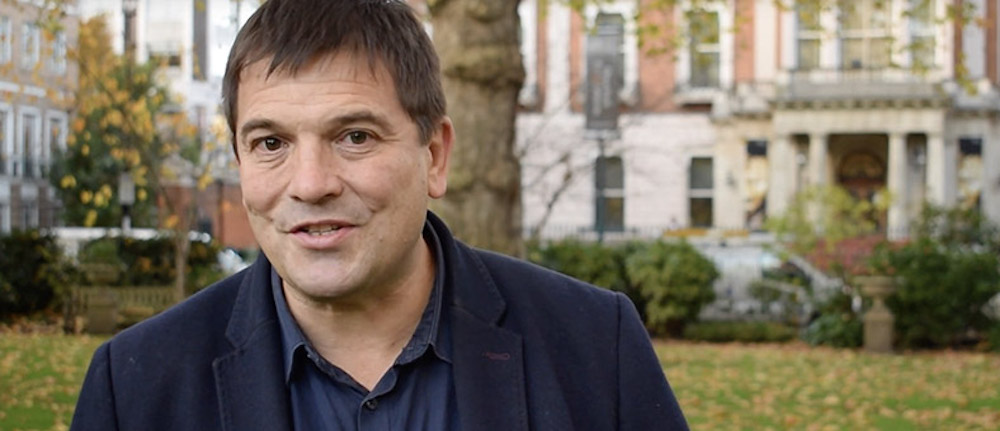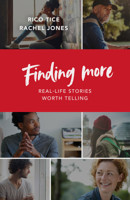
To celebrate the launch of Finding More, a new collection of testimonies, we spoke to Rico Tice about why sharing your own story can be so powerful in evangelism and how to go about doing it.

Is there something more to life? Fascinating life stories of people who found the answer
Christians use the word testimony to describe telling a story as a witness to what Christ has done in their lives. So a testimony is simply the story of the work of Christ in your life.
If you think about it, a testimony is actually three stories coming together—God’s story, my story, and the story of the person you are sharing it with. The big story of what God is doing in the world, my story of how God has changed my life personally and also a reaching out, asking 'how would this affect your story?'
Experience in the Bible is very important. Time and again we see people like the apostle Paul tell their own story. He tells the story of his conversion on the Damascus road (Acts 9:1-22) - so that sense of how the person of Christ has affected an individual life is huge in the Bible.
At the heart of evangelism is a miracle that God has done - as we speak about Jesus, God opens blind eyes. The reason a testimony is so powerful is that wherever you stand philosophically, you can’t deny a change, or indeed a miracle, in someone’s life.
So the man born blind in John chapter 9 says 'I was blind, now I can see, and it’s because of Jesus!' And they want to throw him out of the synagogue. The reason it’s so powerful is that there’s no question of the change - you can see that in Finding More too.
A testimony is a chance to say to someone - 'wherever you stand, what do you make of this change?'
Whether telling your own story or sharing the gospel there is a pain line to be crossed. We don’t move naturally into this because it is a cosmic battle. So it might never be seamless—there’ll always be a change of gear. But because it’s your own story and we are in a culture that values story so highly I think to ask ‘Could I tell my story?’ is something people are open to.
But don’t think that it’s easy—we need to pray and have courage, which is why in the Acts of the Apostles the biggest prayer is for boldness.
What was I like before? Tell the story about how you were living in God’s world without reference to him and share examples of that.
What happened? Well my eyes were opened to the fact I needed rescue, there would be a judgment, Christ died to forgive me, he rose and is Lord. This is the key to it all!
What difference has it made? Jesus says in John 10:10 that he gives life to the full. So how have I been flourishing since I’ve been following Jesus? It’ll be costly too of course, but how is it wonderful?
What about you? The great thing to do at the end of a testimony is to leave it open and say ‘now what do you make of that?’ or a pain line question like ‘what do you think of the resurrection of Jesus? Can you see how I get hope from that?’
The best spontaneity is rehearsed. My advice would be to write out your testimony and to memorise it. This means that as I speak to you I can give myself to you in chatting rather than worrying about what I’m going to say. And that takes practice.
So I write it out, practice it and ask God for opportunities to share it.
I don’t think it’s a worry to talk about yourself, as long as you’re not the hero. As you speak make sure that Jesus and what he’s done is the hero. He had to die for my sin, he rose again because I’m going to die and I can’t do anything about it.
So there could be quite a lot about your own life in it—that’s fine. I love hearing people’s stories. It’s making sure God gets the credit and not you.
People won’t like the bits of your story that tell them Jesus is unique, that sin is real and that there will be judgment. But put that in your words and experience ‘I realised there would be a day of judgement because the resurrection happened’ or 'I was not living as I should in God's world' or ‘I realised that I desperately needed forgiveness’.
And float the difficult doctrines on outcomes everyone can applaud—such as becoming a kinder and more forgiving person. Even if they don’t like the gospel, people are quite pleased that the Christian has those characteristics.
Story and people’s stories are the currency in the culture. Someone said ‘he who has the best story wins’ and I do think that Christians have the best stories. The stories of how Jesus has changed lives are the best stories.
Say to people 'will you read this story?' and have confidence that people like to read other people's stories. And you can ask people afterwards ‘what did you make of what happened to Caroline or Nicky or Drew in the book?’ They are remarkable stories and they’re for good - say to them 'these people are in better shape, what do you make of it?'
The people in the stories also looked at Mark’s Gospel. So they had a careful look at the story of Jesus in the gospel of Mark - have confidence that will do it’s work. It has transformed the life of millions.
This article was originally posted on the Christianity Explored Ministries website. Finding More is available to buy here.